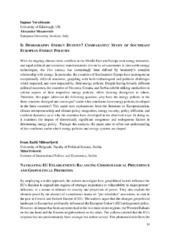Приказ основних података о документу
Navigating EU enlargement: balancing chronological precedence and geopolitical priorities
| dc.creator | Radić-Milosavljević, Ivana | |
| dc.creator | Petrović, Miloš | |
| dc.date.accessioned | 2023-12-19T14:34:59Z | |
| dc.date.available | 2023-12-19T14:34:59Z | |
| dc.date.issued | 2023 | |
| dc.identifier.isbn | 978-86-6425-113-6 | |
| dc.identifier.uri | http://rfpn.fpn.bg.ac.rs/handle/123456789/1111 | |
| dc.description.abstract | By employing a realist approach, the authors investigate how geopolitical factors influence the EU's decision to expand into regions of strategic importance or vulnerability to major powers’ influence, as a means to enhance its security and projection of power. They also explore the obstacle posed by the absence of a unanimous stance on "pre-scheduled" accessions, as seen in the past in Central and Eastern Europe (CEE). The authors argue that the changed geopolitical landscape in Europe has profoundly influenced the European Union's (EU) enlargement policy. However, its impact has been asymmetrical in the two main micro-regions: the Western Balkans on the one hand and the Eastern neighbourhood on the other. The authors contend that the EU's response has not predominantly been strategic but rather tactical. This phenomenon reflects the 15 longstanding deficiencies in the EU's enlargement policy, coupled with the urgent need to extend commitments to the eastern partners who face immediate security threats from Russia. Nevertheless, the authors hypothesise that such tendencies are not advantageous for the Western Balkans, which face lower direct jeopardy from Russia. Consequently, it becomes a lower priority for the European Union, despite its chronological precedence in the enlargement domain. While ideally, both enlargement regions should be granted an "accession timetable" along with on-ground democratic reforms (similar to CEE), the authors highlight that due to differing geopolitical dynamics and pressure, the outcomes for the two regions may either diverge in terms of potential favouring of the new candidates or, perhaps more likely, converge – meaning that the accession of either region might be postponed until after the invasion of Ukraine ends. | sr |
| dc.language.iso | en | sr |
| dc.publisher | Beograd : Udruženje za političke nauke Srbije | sr |
| dc.relation | Nacionalni interesi Republike Srbije: od osporavanja do legitimizacije, Fond za nauku RS, "Ideje" | sr |
| dc.rights | openAccess | sr |
| dc.rights.uri | https://creativecommons.org/licenses/by/4.0/ | |
| dc.source | EU enlargement, geopolitics, and the Russian-Ukraine war: The 2023 Annual International Conference of the Serbian Political Science Association | sr |
| dc.subject | enlargement policy | sr |
| dc.subject | Eastern partnership | sr |
| dc.subject | priority | sr |
| dc.subject | strategy | sr |
| dc.subject | interest | sr |
| dc.subject | security | sr |
| dc.subject | threats | sr |
| dc.title | Navigating EU enlargement: balancing chronological precedence and geopolitical priorities | sr |
| dc.type | conferenceObject | sr |
| dc.rights.license | BY | sr |
| dc.rights.holder | Serbian Political Science Association (SPSA) | sr |
| dc.citation.epage | 15 | |
| dc.citation.spage | 14 | |
| dc.identifier.fulltext | http://rfpn.fpn.bg.ac.rs/bitstream/id/3139/fulltext.pdf | |
| dc.identifier.rcub | https://hdl.handle.net/21.15107/rcub_rfpn_1111 | |
| dc.type.version | publishedVersion | sr |

